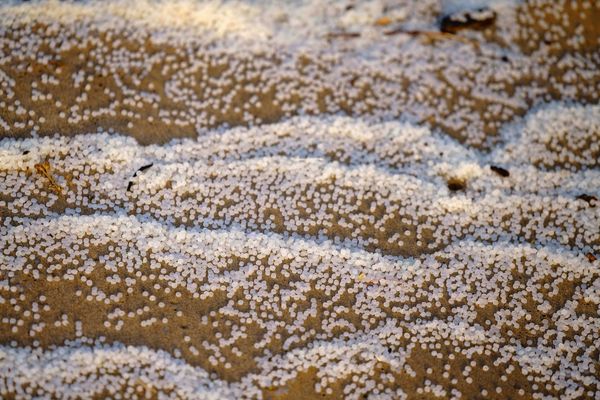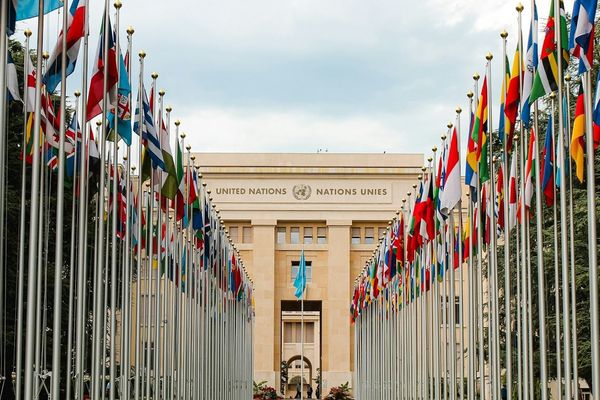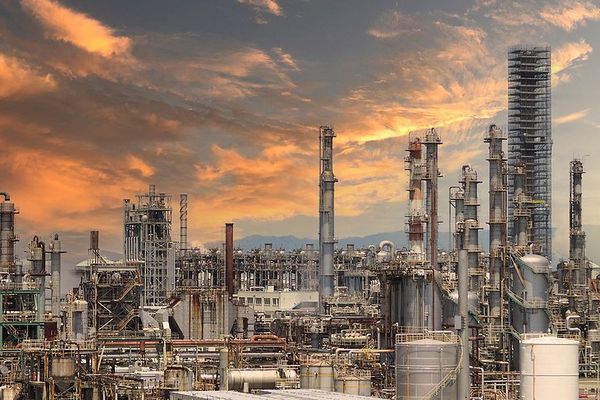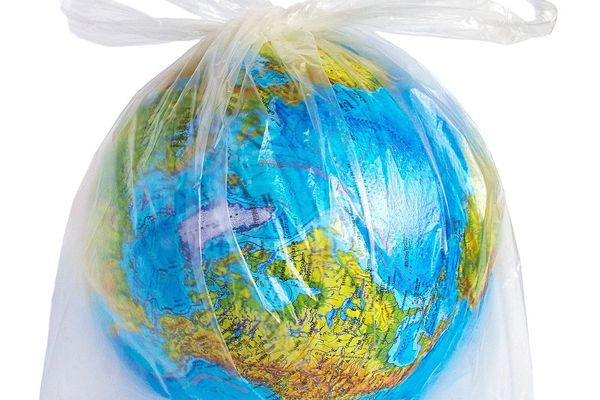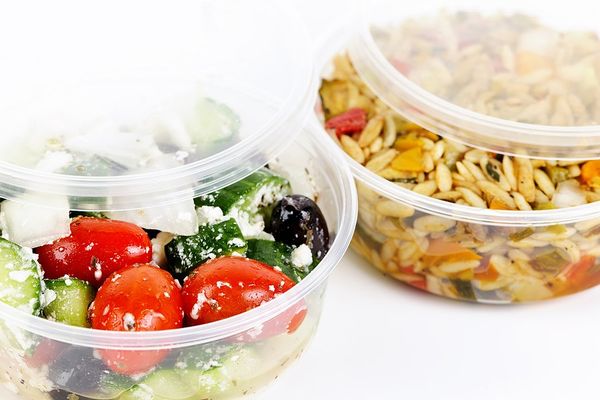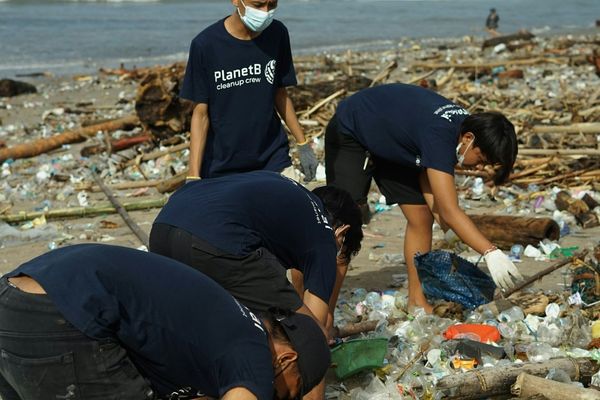endocrine disrupting chemicals
PlasticFree opens access to global materials database during Climate Week NYC
PlasticFree has opened access to its entire global materials database so that it is freely accessible to designers, brands, and businesses looking to move away from plastic-related materials.
Pennsylvania plastics pollution settlement could set a national precedent for control of pellets
The case is the first citizen suit to successfully settle over “nurdles” in an inland waterway. State regulators weighed in to help.
Plastic pollution treaty talks end with no agreement
Negotiators failed to reach a deal on a global treaty aimed at curbing plastic pollution and plan to resume talks at a later date as disputes over production limits and toxic chemicals persist.
In short:
- Delegates from 184 countries clashed over whether the treaty should cap plastic production or focus on recycling, reuse, and safer chemical use.
- Powerful fossil fuel-producing nations and the plastics industry resisted production limits, arguing the treaty should prioritize waste management.
- Negotiators released a revised draft recognizing the unsustainable growth of plastics and the need for a coordinated global response, but no consensus was reached.
Key quote:
“We are going in circles. We cannot continue to do the same thing and expect a different result.”
— Graham Forbes, head of Greenpeace delegation in Geneva
Why this matters:
Negotiations produced a draft that acknowledges the runaway growth of plastics and the global health and environmental risks — microplastics in oceans, toxic chemicals leaching into food and water, and communities burdened by mountains of waste — but it’s still just words on paper. The world is still waiting for leadership to turn concern into concrete action.
Read more: Read more:
- U.S. pressures countries to drop global plastics cap at treaty talks
- A stalled global plastic treaty threatens our future fertility
- Environmental justice advocates criticize lack of inclusion in plastic treaty negotiations
- Petrochemical plants send millions of pounds of pollutants into waterways each year: Report
Plastic treaty talks collapse over production limits and chemical controls
Negotiations on the world’s first global treaty to curb plastic pollution have hit a dead end, with nearly 100 countries rejecting a draft they say fails to tackle production or toxic chemicals.
In short:
- Countries pushing for strong action, including the European Union, UK, and Colombia, say the draft treaty ignores plastic production caps and the risks of harmful chemicals.
- Oil- and plastic-producing nations, backed by industry interests, want the treaty to focus only on recycling and waste management, avoiding limits on production.
- Delegates warn that without binding measures on production, chemicals, and financing, the treaty risks being a “step backward” in global efforts to reduce plastic pollution.
Key quote:
“It certainly seems like it was very biased toward the like-minded countries [Saudi, Russia, Iran etc]. There’s problems across the board. There’s no binding measures on anything. There’s no obligation to contribute resources to the financial mechanism. There’s no measures on production or chemicals. This text is just inadequate.”
— Dennis Clare, negotiator for Micronesia
Why this matters:
The world’s first attempt at a global plastic pact has hit the skids, and it’s exposing just how deep industry influence runs. Without binding measures, experts warn, this treaty could be less a breakthrough and more a global shrug, leaving ecosystems and public health to bear the cost.
Read more:
- U.S. pressures countries to drop global plastics cap at treaty talks
- A stalled global plastic treaty threatens our future fertility
- Environmental justice advocates criticize lack of inclusion in plastic treaty negotiations
- Petrochemical plants send millions of pounds of pollutants into waterways each year: Report
Final push for plastic pollution treaty talks as groups urge bold action
Environmental and Indigenous leaders are pushing for a strong, legally binding treaty to curb plastic pollution, as United Nations negotiations in Geneva near their conclusion.
In short:
- Environmental and Indigenous groups rally outside the UN in Geneva, calling for a robust treaty to tackle plastic pollution.
- The key issue centers on whether to limit plastic production or focus on recycling and reuse.
- Some nations, like Panama, are pushing for caps on plastic production, while oil-producing countries resist such measures.
Key quote:
“We need people outside of here to tell their countries to speak up for what it is that they’re standing for. Are they standing for them, their citizens, or big oil?””
— Juan Carlos Monterrey Gomez, head of Panama’s delegation
Why this matters:
The outcome of these talks will determine how much progress the world can make in curbing plastic production and its harmful effects on ecosystems and human health. Should the focus be on reducing plastic production, or will the world double down on recycling and reuse? This treaty is critical for public health — the chemicals used in plastic production and plastic recycling have been linked to a slew of health problems, from hormonal disruption to cancer. The final push is now, and the world is waiting for a resolution that doesn’t just clean up the current mess but slows its growth.
Read more:
- A stalled global plastic treaty threatens our future fertility
- A plastic recipe for societal suicide
- Environmental justice advocates criticize lack of inclusion in plastic treaty negotiations
- DuPont letter shows plastics industry dismissed recycling as viable solution in 1974
- What is chemical recycling?
Hidden chemical load rivals climate crisis in scale of risk
A new report warns that the world’s 100-million-plus industrial chemicals are contaminating air, water, and human bodies with health effects ranging from ADHD to cancer.
In short:
- Researchers at Deep Science Ventures examined hundreds of studies and interviews and identified 3,600 food-contact chemicals in people, 80 of them deemed especially hazardous.
- PFAS “forever chemicals” now fall with rain and 90% of the global population breathes air that violates WHO limits.
- The review argues that toxicity testing still misses nonlinear, low-dose endocrine effects and receives only a sliver of the funding directed at climate research.
Key quote:
“The way that we’ve generally done the testing has meant that we’ve missed a lot of effects.”
— Harry Macpherson, senior climate associate, Deep Science Ventures
Why this matters:
From plastic wrappers to pesticide residues, synthetic compounds are with us from cradle to grave. Many slip past regulatory filters because traditional toxicology assumes that smaller doses are safer. Yet hormones operate on trillionths of a gram, and chemicals that mimic them can short-circuit development, immunity, and fertility at trace levels. Once released, these molecules cycle through soil, water, and air, reaching remote regions and persisting for decades. Health costs — from asthma medication to fertility treatment — land on families and public budgets, while manufacturers often face little accountability. As climate change reshapes ecosystems, chemical load adds another invisible pressure on wildlife and humans, complicating efforts to safeguard food, water, and future generations.
Related: Runaway plastic production fuels $1.5tn annual health burden, Lancet review finds
New push for a global plastic treaty faces political divide over production cuts
A new round of global talks in Geneva may be the world’s last chance to seal a strong treaty to end plastic pollution, but deep divides remain.
In short:
- Delegates from nearly every nation are negotiating a legally binding treaty to tackle plastic pollution, with sharp disagreements over whether to cap production or just improve recycling and waste management.
- Powerful oil and plastics-producing nations, including the U.S. and Saudi Arabia, oppose production limits, while 100+ countries, along with major companies like Walmart and Coca-Cola, support cuts alongside recycling mandates.
- Indigenous leaders and small island nations say plastic pollution is threatening their food, health, and economies, and stress that the talks must not end in weak compromises.
Key quote:
“We will never recycle our way out of this problem.”
— Graham Forbes, Greenpeace plastics campaign lead
Why this matters:
Plastic is leaching into our food, our water, even our bodies. It's been linked to serious health issues, from endocrine disruption to cancer. This might be the world's last real shot at a global treaty that doesn’t just sweep the mess around. The question is whether political will can overpower petrochemical lobbying, and whether the world is ready to stop treating plastic like it’s disposable when it’s anything but.
Read more:






